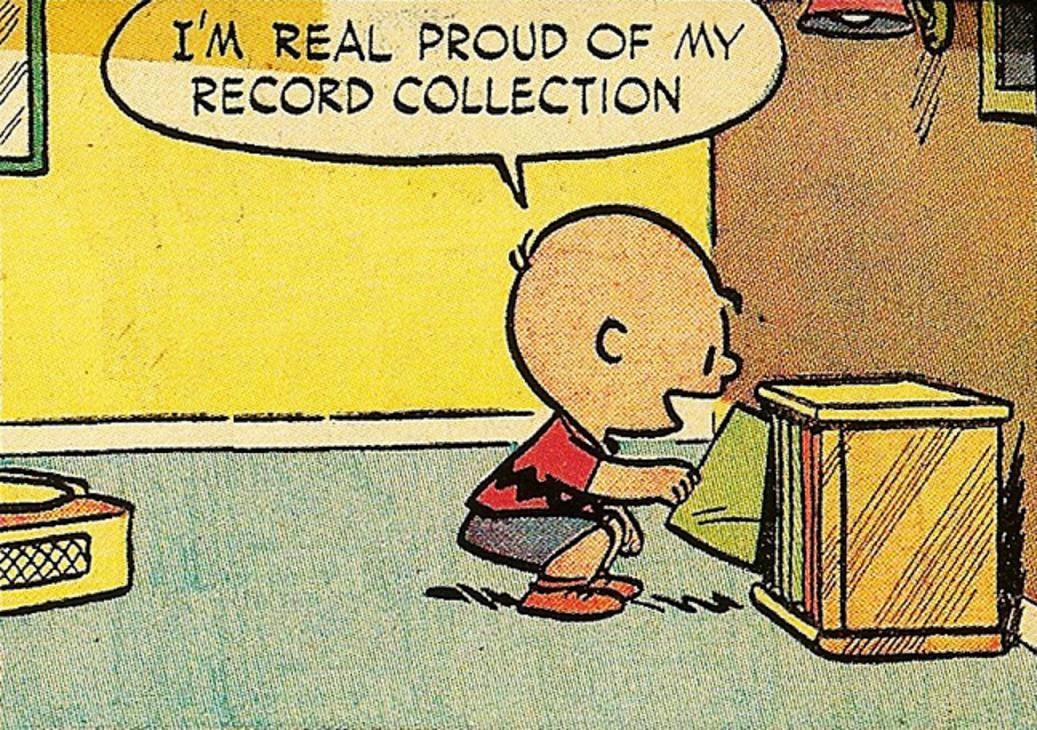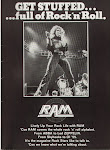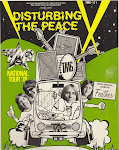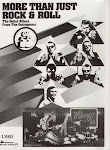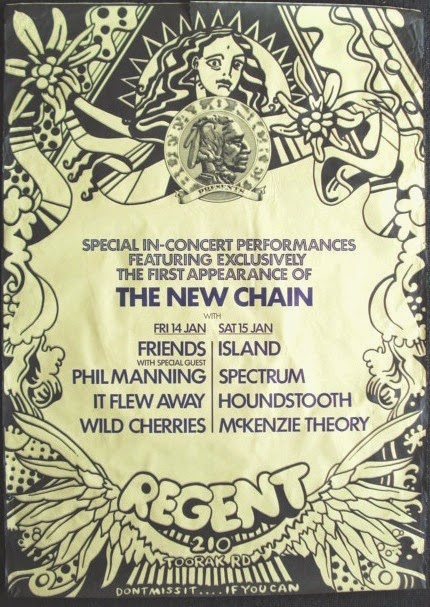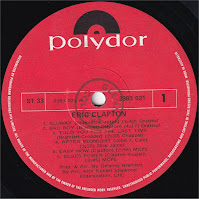(U.K 1962 - Present)
By the time
Eric Clapton launched his solo career with the release of his self-titled debut album in August 1970, he was long established as one of the world's major rock stars due to his group affiliations -- the Yardbirds, John Mayall's Bluesbreakers, Cream, and Blind Faith -- which had demonstrated his claim to being the best rock guitarist of his generation. That it took Clapton so long to go out on his own, however, was evidence of a degree of reticence unusual for one of his stature. And his debut album, though it spawned the Top 40 hit "After Midnight," was typical of his self-effacing approach: it was, in effect, an album by the group he had lately been featured in, Delaney & Bonnie & Friends.
Not surprisingly, before his solo debut had even been released, Clapton had retreated from his solo stance, assembling from the Delaney & Bonnie & Friends ranks the personnel for a group, Derek & the Dominos, with which he played for most of 1970. Clapton was largely inactive in 1971 and 1972, due to heroin addiction, but he performed a comeback concert at the Rainbow Theatre in London on January 13, 1973, resulting in the album
Eric Clapton's Rainbow Concert (September 1973). But Clapton did not launch a 'sustained solo' career until July 1974, when he released 461 Ocean Boulevard, which topped the charts and spawned the number one single "I Shot the Sheriff."
 |
| Delaney, Bonnie and Clapton On Stage 1970 |
But back to his first solo album.
When Delaney and Bonnie's tour of England ended, the two men went into the studio in Los Angeles and began work on Clapton's first solo album, 'Eric Clapton'. Delaney's influence on the record was considerable. He produced the album - which includes the joyful "Blues Power" and the fiery "Let It Rain" - and supplied most of the players from his own band, alongside Bonnie. His hand is especially evident on the alternative version of J.J Cale's "After Midnight" - which Delaney mixed and which features a horn section that does not appear on the L.P track. With Delaney's encouragement - Clapton emerged as a front man for the first time since he had been propelled into superstardom with Cream earlier. Clapton wrote or co-wrote eight of the eleven tunes on the record, sang all the lead vocals and played crisply and spiritedly.
In Philip Norman's recent biography of Clapton entitled 'Slowhand' (2018), he notes - "The cover showed him in a fancy western-style white suit, slumped in a chair with his Fender Stratocaster 'Brownie' beside him, the same guitar he used to record Layla. (On a side note, Eric sold this guitar at a charity auction held at Christie's for $497,000 in 1998). He was back to being bearded yet again, and had a wary, reluctant look as if not totally convinced this was such a good idea.
 |
| Clapton playing 'Brownie' |
It was not easy to change the deep-rooted perception of him as a brilliant contributor to albums as a session player rather than somebody able to carry a whole one on his own. And, although purchased in large quantities by his 'God' constituency, Eric Clapton failed to make either the British or US Top 10 with this one.
The music press, which had always been so kind to him, was almost unanimously dismissive: Melody Maker found 'depressing monotony' in 'a forced white version of soul and gospel as performed originally by Ike and Tina Turner and the Stax label artists', while Fusion magazine called it 'warmed-over Delaney and Bonnie with a little leftover Leon Russell'. A few tracks were singled out for praise, like 'Easy Now' and 'Let It Rain', a staple of his live shows ever afterwards.

Nor did it help that, at this moment of bidding for solo recognition, he was back in a band (Derek and The Dominos) that didn't even mention his name and, instead of promoting himself on the international stage, was playing venues specially chosen for their smallness and obscurity. His way of launching Derek and the Dominos, that same month, was a club tour of the UK on which, at his insistence, all tickets cost only 1 pound.
In London, rather than the Albert Hall or the Lyceum, they played the Speakeasy and his long-ago stomping-ground, the Marquee. If any club-owner slyly slipped his name onto a poster, he was furious.
To interviewers, he insisted that in Bobby Whitlock, Carl Radle and Jim Gordon he'd finally found his true soulmates, and that Derek and the Dominos could never go the way of Cream, Blind Faith or Delaney & Bonnie." [Page 238, Eric Clapton 'Slowhand', by Philip Norman, 2018]
Album Reviews
(i) Well, to tell you the truth, Eric, we had begun to wonder. What with all the running around you've been doing of late, we'd begun to worry that you'd become just another studio musician, hobnobbing with the rich and famous. After all, overexposure to Leon Russell has been known to turn some people into wind-up tambourine-beating rocknroll dolls.
But no. Even though it's a "supersession," even though the personnel is liberally salted with old Delaney and Bonnie Friends, it comes off as a warm, friendly record of the kind that I haven't heard since the first Delaney and Bonnie album. Of the tunes, we have some good old tambourine beaters, one beautiful all-acoustic piece authored entirely by Clapton (most of the rest are by him and Delaney Bramlett, who produced), and a bunch of simply delightful D'n'B-styled gospel-type numbers, which, unlike a lot of the recent attempts in this genre, succeed because they build sensibly to a climax rather than indulging in the type of excess that spoiled Leon Russell's album, at least for me.

Clapton's voice is a revelation. He'd been scared to use it before because he thought it was terrible, but Delaney told him that his voice was a gift from God, and if he didn't use it, maybe God would take it away from him. Which, I thought, is maybe a nice way of saying "Well, maybe it ain't too hot, but you should sing along anyway." But Clapton's voice is just fine; rough and unfinished, maybe, but it adds to the rustic quality of the music. [by Ed Ward, September 3, 1970]
(ii) Eric Clapton's eponymous solo debut was recorded after he completed a tour with Delaney and Bonnie. Clapton used the core of the duo's backing band and co-wrote the majority of the songs with Delaney Bramlett -- accordingly, Eric Clapton sounds more laid-back and straightforward than any of the guitarist's previous recordings. There are still elements of blues and rock 'n' roll, but they're hidden beneath layers of gospel, R'n'B, country, and pop flourishes. And the pop element of the record is the strongest of the album's many elements -- "Blues Power" isn't really a blues song and only "Let It Rain," the album's closer, features extended solos.

Throughout the album, Clapton turns out concise solos that de-emphasize his status as guitar god, even when they display astonishing musicality and technique. That is both a good and a bad thing -- it's encouraging to hear him grow and become a more fully rounded musician, but too often the album needs the spark that some long guitar solos would have given it. In short, it needs a little more of Clapton's personality. [Review by Stephen Thomas Erlewine]
This post consists of FLACS ripped from my vintage vinyl (yes, it's more than 50 years old folks) and includes full album artwork for both vinyl and CD formats, along with label scans. As a bonus, I thought it appropriate to add Clapton's remake of J.J Cale's hit "After Midnight" from 1987, as a sweetener. If you get a chance, read his biography by Philip Norman entitled 'Slowhand' which for me provided a wonderful insight into the life and tribulations of this amazing and resilient artist.
01. Slunky - 3:33
02. Bad Boy - 3:33
03. Lonesome And A Long Way From Home - 3:29
04. After Midnight - 2:51
05. Easy Now - 2:57
06. Blues Power - 3:08
07. Bottle Of Red Wine - 3:06
08. Lovin' You Lovin' Me - 5:02
09. I've Told You For The Last Time - 3:06
10.Don't Know Why - 3:10
11.Let It Rain - 5:02
12. After Midnight (Bonus 1987 Version) - 4:07
Musicians
*Eric Clapton - Guitar, Vocals
*J.I. Allison - Vocals
*Bonnie Bramlett - Vocals *Delaney Bramlett - Rhythm Guitar, Vocals
*Rita Coolidge - Vocals
*Sonny Curtis - Vocals
*Jim Gordon - Drums
*Bobby Keys - Saxophone
*Jim Price - Trumpet
*Carl Radle - Bass
*Leon Russell - Piano
*John Simon - Piano
*Bobby Whitlock - Organ, Vocals
 The Gun were a little-known 60s British acid rock band who evolved into the 70s progressive hard rock trio Baker Gurvitz Army. The Gun began as The Knack, formed in 1963 by guitarist/vocalist Paul Gurvitz (born Paul Anthony Curtis, 6 July 1947, High Wycombe, Buckinghamshire; he was known by the surname Curtis until the early 1970s. Thereafter he adopted his family's actual surname, Gurvitz. The Knack changed its name with the development of a psychedelic style in the spring/summer of 1967, performing] at the final UFO Club concerts with bands such as Pink Floyd. In November, 1967 they made recordings for the BBC's newest flagship alternative music radio programme, Top Gear and twice played in the air.
The Gun were a little-known 60s British acid rock band who evolved into the 70s progressive hard rock trio Baker Gurvitz Army. The Gun began as The Knack, formed in 1963 by guitarist/vocalist Paul Gurvitz (born Paul Anthony Curtis, 6 July 1947, High Wycombe, Buckinghamshire; he was known by the surname Curtis until the early 1970s. Thereafter he adopted his family's actual surname, Gurvitz. The Knack changed its name with the development of a psychedelic style in the spring/summer of 1967, performing] at the final UFO Club concerts with bands such as Pink Floyd. In November, 1967 they made recordings for the BBC's newest flagship alternative music radio programme, Top Gear and twice played in the air. Soon to expand into a sextet, with Paul's younger brother Adrian, then they were consisting as a power trio of Paul Curtis as bassist, Adrian Curtis (Adrian Gurvitz) as guitarist/vocalist (he also wrote all music and lyrics of The Gun), and drummer Louie Farrell (born Brian John Farrell, 8 December 1947, Goodmayes, Essex; he joined The Knack in mid 1966) to release two albums after being signed to CBS Records in early 1968.
Soon to expand into a sextet, with Paul's younger brother Adrian, then they were consisting as a power trio of Paul Curtis as bassist, Adrian Curtis (Adrian Gurvitz) as guitarist/vocalist (he also wrote all music and lyrics of The Gun), and drummer Louie Farrell (born Brian John Farrell, 8 December 1947, Goodmayes, Essex; he joined The Knack in mid 1966) to release two albums after being signed to CBS Records in early 1968. Their debut album's cover is noteworthy as an early example of the work of Roger Dean, who was later responsible for producing trademark covers for super bands such as Yes, Greenslade and Asia. Allmusic describes it as having a "distinctive psych-flavored proto-metal" sound [Extracts from wikipedia].
Their debut album's cover is noteworthy as an early example of the work of Roger Dean, who was later responsible for producing trademark covers for super bands such as Yes, Greenslade and Asia. Allmusic describes it as having a "distinctive psych-flavored proto-metal" sound [Extracts from wikipedia]. "Race With The Devil" (2006 French exclusive limited edition 4-track CD) was issued as part of the 'EP Collection Original Versions' series, remastered in high definition 24-bit, originally released in France in 1968. It featured four tracks: - "Race With Devil / Sunshine / Drives You Mad / Rupert's Travels".
"Race With The Devil" (2006 French exclusive limited edition 4-track CD) was issued as part of the 'EP Collection Original Versions' series, remastered in high definition 24-bit, originally released in France in 1968. It featured four tracks: - "Race With Devil / Sunshine / Drives You Mad / Rupert's Travels".

